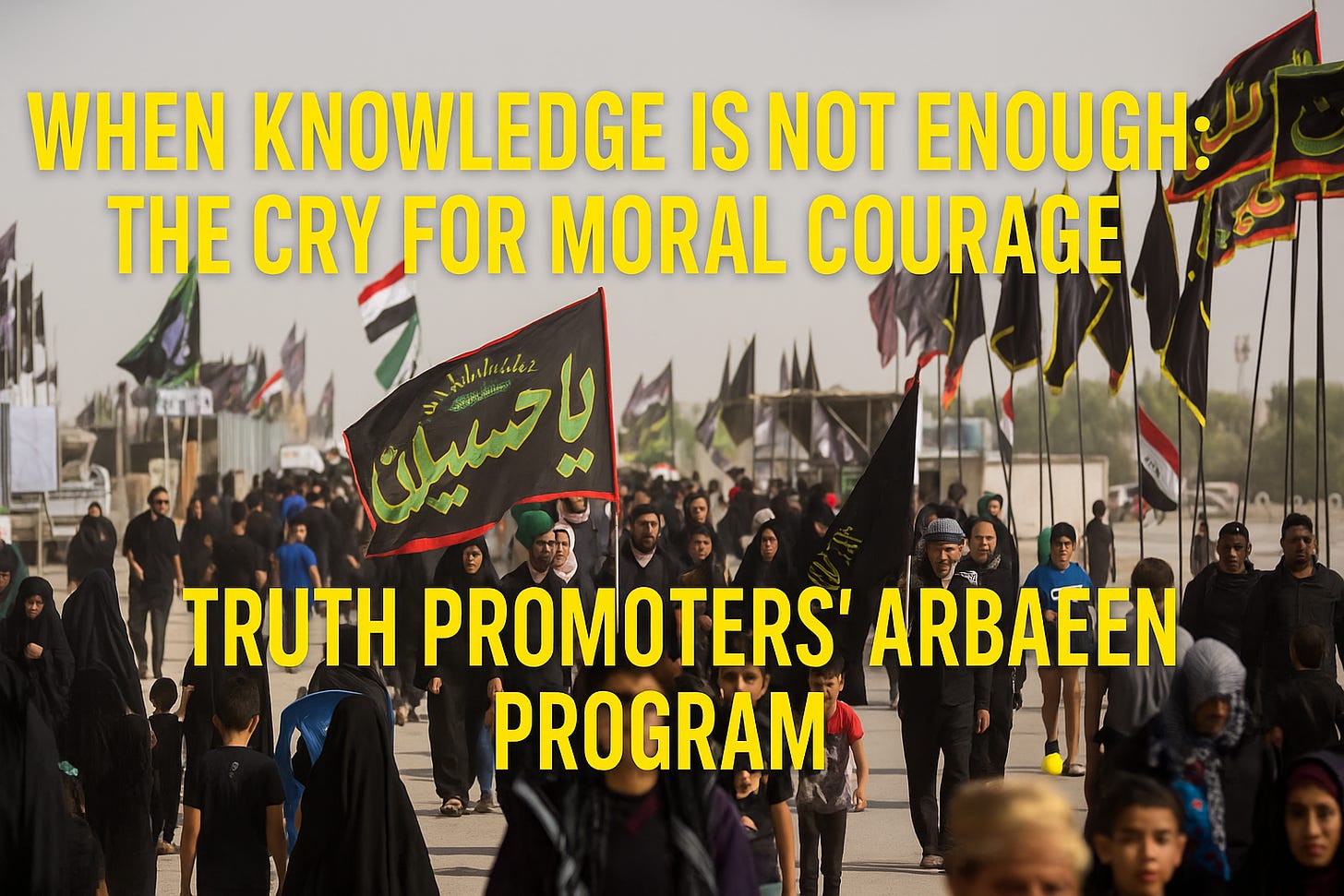When Knowledge is Not Enough: The Cry for Moral Courage – Truth Promoters’ Arbaeen Program
An Arbaeen night of remembrance and resistance — reviving the pulpit as a platform of truth, clarity, and moral courage.
GLOBAL, PUREWILAYAH.COM – On the second night of the Arbaeen 2025 program organized by the Truth Promoters Group, the gathering continued with a solemn and contemplative atmosphere.
Building upon the previous evening’s discourse on the sacred responsibility of the pulpit and the burden of entrusted knowledge, the focus of this session shifted toward a critical theme: the peril of knowledge devoid of sincerity, and the hollowness of learning when detached from moral purpose and transformative action.
As with each night in the series, the program proceeded in a structured and reverent sequence — commencing with the recitation of the Holy Qur’an, followed by poetic couplets, a keynote lecture by Sheikh Shabbir Hassanally, the narration of the maqtal, recitations of noha and latmiya, and concluding with the Ziyarat Arbaeen.
The Sacred Duty of Clarification: Sheikh Shabbir Hassanally
In his lecture titled “The Sacred Trust of the Pulpit”, Sheikh Shabbir Hassanally expanded on the theme of Tabyeen—clarification—as both a divine mandate and an act of resistance. The Sheikh emphasized that the pulpit, whether physical or digital, carries immense responsibility. It is not simply a platform for speech, but a sacred trust to guide with sincerity, expose falsehood, and affirm the truth.
He warned against the misuse of religious authority for personal gain or political manipulation, referencing prophetic traditions that critique scholars who sacrifice truth for comfort or power. True leadership, he noted, is grounded in humility, knowledge, and alignment with the Qur’an and the teachings of the Ahlul Bayt (as).
A poignant section of the lecture addressed the silence of scholars in the face of injustice. Sheikh Shabbir decried this silence as a betrayal of the message of Karbala, arguing that genuine wisdom lies in the courage to speak truth to power.
He urged the audience to seek knowledge from qualified scholars and to engage critically and conscientiously in their religious journey. “Tabyeen,” he concluded, is not a privilege—it is a form of jihad for truth, clarity, and integrity.
🔗 Full lecture text: Tabyeen 12 - Reflections313
The Aftermath at Karbala: Sayyeda Zainab (sa) as the Voice of Tabyeen
The maqtal narration centered on the powerful aftermath of Karbala, where Sayyeda Zainab (sa) emerged not only as a grieving sister, but as the living embodiment of Tabyeen—clarification through truth.
In the face of unimaginable loss, she refused silence. Her sermons in Kufa and later before Ubaydullah ibn Ziyad and Yazid became acts of sacred resistance, exposing betrayal, injustice, and moral corruption.
Through fearless speech and unwavering conviction, Sayyeda Zainab carried the legacy of Imam Hussain (as) beyond the battlefield. Her words transformed sorrow into clarity, grief into guidance. Without a pulpit, she fulfilled its duty—proving that Tabyeen is not bound by platform, but upheld by those who dare to speak truth when it is most needed.
🔗 Full maqtal: Arbaeen Maqtal 2 - The Journey From Karbala to Kufa
Noha & Latmiya Performance
On the second night of the Truth Promoters Arbaeen Majlis programme, audiences were moved by the stirring lamentation “Now He Is Gone”, a nohe that carried the raw weight of Karbala’s grief and the enduring spirit of resistance. In a rhythmic sequence of verse and refrain, the piece wove imagery of desolation, steadfast loyalty, and undying devotion to Imam Hussain (peace be upon him). Each stanza unfolded like a mourning procession through history, from the dust and ruin left by oppression, to the steadfast stand of Hussain’s companions, to the eternal vow of believers never to abandon his cause.
The nohe’s refrain — “Oh they call out your name, all alone on that plain, never life will be the same, now he’s gone Ya Hussain” — struck like the tolling of a bell, each repetition deepening the audience’s connection to the loss and its meaning. Interlacing grief with resolve, the verses recalled Hussain’s guidance, the unity he nurtured, and his role as the restorer of pure Islam amidst deceit and tyranny. More than a mourning elegy, “Now He Is Gone” was a rallying call — a reminder that the blood of Karbala’s martyrs is a covenant of resistance, inspiring the faithful to stand unyielding against injustice in every age.
🔗 Listen: Now He Is Gone - ShiaSounds
The Pure Legacy: The Communion of Arbaeen
The evening reached its emotional peak with a poetic reflection on Ziyarat Arbaeen, entitled “The Pure Legacy.”
Honoring Imam Hussain (as) as the pure descendant of the Prophet and Lady Zahra (sa), the poem likened his unwavering stand to that of Prophet Ibrahim—alone before idols, yet with no miracle to spare him the suffering.
It evoked the unseen pain of Karbala, where Lady Zahra (sa) witnessed every arrow and the thirst of innocent children. The verses denounced those who memorized the Qur’an yet betrayed its essence, and those who traded truth for fleeting power.
The stanza concluded with a haunting question: Where was your love when the head of the Prophet’s grandson was raised on a spear?
🔗 Listen: The Communion of Arbaeen - ShiaSounds
Multilingual Access via Hyder AI
As part of an ongoing partnership with the Hyder AI platform, all lectures delivered by Sheikh Shabbir Hassanally—alongside other scholars in the series—are now accessible in multiple languages.
This initiative aims to make the spiritual and intellectual treasures of the Arbaeen commemorations more widely available. Viewers can access the sessions on the Hyder AI platform at: https://www.hyder.ai/en/lecture/56
For continued coverage and detailed reports of the Arbaeen nights, follow Pure Wilayah’s official Telegram channel and website.
Watch the Full Majlis Recording
Program References
(PW)


